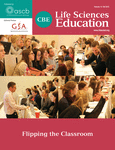Uncovering Scientist Stereotypes and Their Relationships with Student Race and Student Success in a Diverse, Community College Setting
Abstract
A number of studies have identified correlations between children’s stereotypes of scientists, their science identities, and interest or persistence in science, technology, engineering, and mathematics. Yet relatively few studies have examined scientist stereotypes among college students, and the literature regarding these issues in predominantly nonwhite and 2-yr college settings is especially sparse. We piloted an easy-to-analyze qualitative survey of scientist stereotypes in a biology class at a diverse, 2-yr, Asian American and Native American Pacific Islander–Serving Institution. We examined the reliability and validity of the survey, and characterized students’ comments with reference to previous research on stereotypes. Positive scientist stereotypes were relatively common in our sample, and negative stereotypes were rare. Negative stereotypes appeared to be concentrated within certain demographic groups. We found that students identifying nonstereotypical images of scientists at the start of class had higher rates of success in the course than their counterparts. Finally, evidence suggested many students lacked knowledge of actual scientists, such that they had few real-world reference points to inform their stereotypes of scientists. This study augments the scant literature regarding scientist stereotypes in diverse college settings and provides insights for future efforts to address stereotype threat and science identity.



